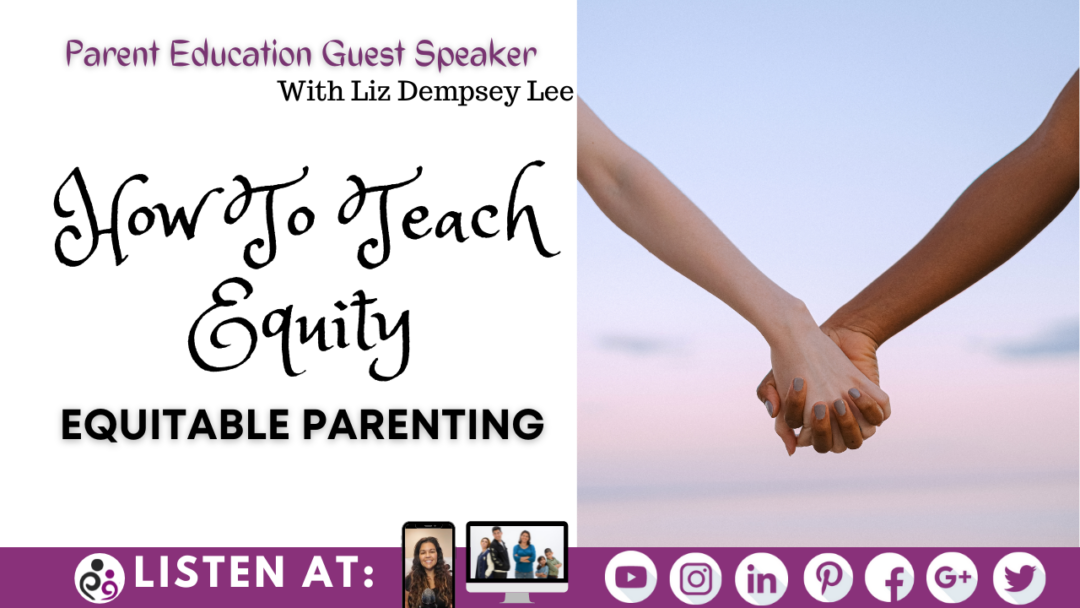How To Teach Equity At Home with Liz Dempsey Lee. Liz talks about how to be a more equitable parent, tips for teaching equity in the home, and why teaching equity is so important!
Click on the link below to listen to the podcast!
How To Teach Equity At Home. Links in Episode 👇
- More from The Impactful Parent https://theimpactfulparent.com
- Liz’s contact information is www.lizdepseylee.com
Rate, Review, & Subscribe!

“I love Kristina and all the FREE tips that she has to offer! Thank you for making my parenting journey better!” <– If that sounds like you, please consider rating and reviewing my show! This helps me support more people — just like you!!!
Rate with five stars, and select “Write a Review.” Then be sure to let me know what you loved most about the episode!
Also, if you haven’t done so already, subscribe to the podcast. I’m adding a bunch of bonus episodes to the feed and, if you’re not subscribed, there’s a good chance you’ll miss out. Subscribe now!
What to do next:
Follow The Impactful Parent on social media if you don’t already! Facebook, Instagram, LinkedIn, & Pinterest
Subscribe to the PODCAST and/or the YOUTUBE CHANNEL! Podcast link & YouTube link
Check out the official website of The Impactful Parent for FREE RESOURCES, parenting classes, mom’s groups, and so much more! Click here to check it out!
Discover how you can work with Kristina! Sign up for a FREE 30-minute discovery call! Click here to find a time that works best for you!
Bottom Line… I am here for YOU! Contact me at theimpactfulparent@gmail.com

Transcript for HOW TO TEACH EQUITY AT HOME
Kristina: Welcome impactful parent. Today, we will talk about ways parents can weave equity into their family life and parenting. I have a special guest, Liz Dempsey Lee. Liz is a mom, an educator, a writer, a speaker, a consultant, and most importantly, she specializes in teaching equity. I’m very excited to have her on today. Thank you for being here, Liz.
Liz: Thank you so much for having me, Kristina. It’s a pleasure to be here.
Kristina: I want to start off with a very quick definition of equity so that we can all be on the same page as we start our conversation.
Liz: I like to describe it as thinking about fairness within the community context. Every person, or in this case every child, within a community has to access to the things they need to become functional adults.
Kristina: Why does it matter to me as a parent to really learn what you will be teaching us today?
Liz: I appreciate this question. I’m going to start off by talking a little bit about what is considered good parenting and what is considered successful parenting. Are the ideas about good parenting and successful parenting reasonable in your community?
What’s happened over time has been that our ideas about what makes a good parent and what makes a successful parent has become narrow. This puts a tremendous amount of pressure on parents. This pressure makes many of us feel like we’re always doing it wrong. So when you start thinking about equity, one of the first things you have to think about is your particular community’s expectations for you as a parent. What expectations do you feel? Are these expectations reasonable?

How To Teach Equity
Our main goal is to have children who are happy, functional, healthy adults. Sometimes the definitions of good parenting become so narrow that they actually veer away from that ultimate goal. For example, in my community, the Boston area, we have a traditionally academic view of what it means to be good parents for a successful child. There’s a lot of pressure on us to have our kids be good at everything that they do in the academic realm, whether that actually suits the child or not. So how does this relate to equity? Well, one of the first things is that if you have a very narrow definition of what you should be doing as a parent, you’re actually leaving many people behind.
Kristina: There is a lot of pressure on parents, and it’s increasingly becoming worse. Media has made it even harder on parents because everyone feels like they have to keep up with the Jones’.
Liz: We’re often told that our parenting is individual. And to a certain extent, that’s true. Someone else is not going to come and bail out my child if there’s an issue. However, our parenting is not in a vacuum and is more in an ecosystem. For example, if every child in your child’s classroom dropped two plastic straws a day for a week, we’d have this huge mass of plastic straws around your child’s school.
That is the kind of understanding I am trying to get parents to understand. Individually, there’s not a lot of responsibility on the surface. But collectively, if everyone acts in the same way, collective actions ripple out into the community. The collective result can be good or bad. Over the last couple of years, we’ve seen that if everyone pays attention to not using plastic straws, we can have that same kind of ripple effect, but positively. So parenting, even though we’re often told it’s individual by family, it doesn’t exist in a vacuum. That’s why we feel pressure to conform to the “normal” of our community. I can give an example.
In my community, academic success is highly valued. Several after-school math programs in my area charge a ton of money to advance your child in mathematics. A couple parents made a choice to enroll their children. Before you know it, several families also felt the pressure to enroll their children so that their own children wouldn’t fall behind the other kids. The ripple effect was obvious. Suddenly, it was the norm of the community to pay a lot of extra money for math classes after school. Children that don’t even like math were pressured to excel and enroll also. Instead, parents need to be mindful of their parenting practices. Ask yourself, is it the right thing for my kid? Is it the right thing for my community? And does this parenting choice have the desired result? Separate yourself from the stress, and think about it in a way that will allow you to make less anxiety provoked decisions, if that makes sense. I can give you an example.

How To Teach Equity
Two teenagers are taking the SAT. The goal of the SAT is to get the highest score possible. The two children are exactly the same, but one child has a family with many resources, and the other child doesn’t. Child #1 has parents that pay for extra pre-SAT preparation classes and can pay for their child to take the SAT multiple times. The other child does not. Research shows that the child who engages in all this extra work will see a substantial increase in their SAT score. The result is Child #1 appears to be more successful than the other child with the same profile. This is where our parenting actions can reinforce inequities. And again, in my community, it’s very common for people to pay for their children to go through multiple extra activities. In contrast, other children who are equally as successful academically and capable are left behind. That’s where we, as parents, can unwittingly be creating inequities within a community even worse.
Kristina: That is the story of everyday life. We all don’t have the same amount of resources. We don’t have the same amount of anything. We are all coming from different places and can provide our children with different things. Some parents can provide their children with a plethora of resources but don’t provide their children with a plethora of love, time, and attention.
It is also interesting to see that our small decisions affect the entire community. This is true. Our lives leave fingerprints on others. We should look at our parenting as a collective. What are a few concrete actions that parents can take today to get started trying to be more equitable with their children?
Liz: I tell parents to pay attention to the messages that they’re receiving from their community. If you’re wrestling with a parenting decision, are you thinking, “I have to do this,” or “I must do that?” Maybe you are saying to yourself, “I should do this,” or “everybody else is doing this.”
Those are signs that you’re not approaching this parenting decision from the perspective of what your family needs. Instead, you are listening to what other people in the community are saying is important. Frequently, that kind of decision will actually feel physically uncomfortable. So, if you hear yourself saying, “I have to put my child in a soccer clinic; otherwise, they’ll never be as good as their peers,” then rethink your decision process.
Kristina: What else can parents do to incorporate equity into their home?
Liz: When you are at your child’s school, ask what other children in the classroom need. The kids in our community have different needs. Find out what’s best for your child. Then ask how your child’s needs differ from others in the class. Discover what your community needs, not just your child.

How To Teach Equity
The last thing I want to say is that often, parents are afraid to have hard conversations with kids. Yet, equity conversations are important. It’s ok to make mistakes. Talk to your kids. It’s ok to tell your kids that you are confused too and don’t have all the answers.
Kristina: Yes! It is ok not to have all the answers! Instead, tell your child that you don’t know, but you’ll find the answers together! That statement is powerful to kids. Kids can see that their parent is human, but they’re going to help them find answers as a team.
I have one last question for you, Liz. The equity struggle is everywhere. Kids feel it in their everyday lives without realizing it. It usually starts as, “Why does that kid get more time on their test, and I don’t.” Or more common is, “Why does Sara’s mom let her have a phone, and I don’t get one?” How can parents start teaching kids about equity in their real-life situations?
Liz: I’m laughing because the cell phone conversation is one that my son is having right now. I’m feeling this really personally at the moment. When kids bring up issues of fairness, parents should go back to the original definition of equity. Is my child getting what they need to be a successful adult? Understand that it is not a one-size-fits-all.
Just because other families have a cell phone or a later curfew, it doesn’t mean it’s appropriate for our family. One thing I do with my kids is, encourage them to present a case for their argument. I hear out their reasoning and have them think critically about parameters and guidelines. We have a conversation. It becomes an ongoing discussion between my child and me. And if you call me back in a year, I’ll let you know how that’s gone.
Kristina: It is all about starting a conversation. That is the bottom line. Start a conversation with your child about equity.
If people want to learn more about equity from you, where can they find you?
Liz: I have a website and a blog. It is at lizdempseylee.com
Kristina: Until next time, you got this, parents. We’re just here to help.
It takes a lot to run a business and family! Here are a few products I recommend:
Gabb Wireless: The BEST first phone for your child!
- No internet, no social media, and NO WORRIES! This phone has GPS tracking and other features that parents want to have peace of mind about their child having a phone. The Gabb Wireless phone has the sleek look of a smartphone that kids love without worry and high price. To find out more and order your phone (or watch) go to: gabbwireless.com/promo/IMPACTFULPARENT30
The Contract Shop
- Protect your contact and your business with the Contract Shop. The Contract Shop provides DIY legal contracts that you customize for your business and your business needs. Contracts are important and legal documents are boring! The Contract Shop provides the security you need without the big price tags of an expensive law firm. Try it out today and please use my affiliate link for referring you because I get a small kickback for recommending The Contract Shop products. Here is your link: https://thecontractshop.com?ref=kristinacampos
Mobile Monkey
- Mobile Monkey helps you gain more engagement in your social media posts by providing you with a ROBOT to client questions in your DM. This bot is genius and saves so much time! Use your robot to respond to common questions, to create keywords your audience can type in order to receive special links, get analytics, auto-responses and so much MORE! Mobile Monkey should be helping every content creator’s business because at this low price- there are no excuses for getting more time, ease in your business, and increased engagement! Please use my affiliate link to order: https://app.mobilemonkey.com/instachamp?a_aid=kristinaann


